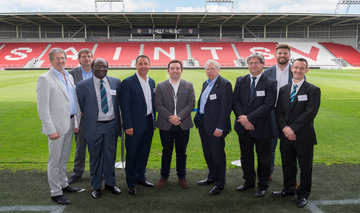The event outlined plans to create two Centres of Glass Excellence at St Helens and the University of Leeds. These two multi-million-pound international research and testing facilities are planned to shape the way forward for the glass sector. Among other ambitions, the hot glass facility is aiming to eliminate CO2 from the manufacturing process.
Attendees learned how they can influence the planned research into clean fuels and innovation to boost manufacturing productivity, and so set the agenda for how the £1.6 billion UK glass sector and its supply chain can benefit from the Glass Futures initiative. Glass Futures is currently pursuing UK government funding streams of circa £60million from BEIS and Innovate UK, part of UK Research and Innovation.
Opening the day, Cllr David Baines, Leader of St Helens Council, said the Council was committed to providing the design and planning work needed to launch Glass Futures – a positive project in a future positive for St Helen’s. “St Helens is a borough with a fantastic history. We’ve got a magnificent legacy of industrial growth in this borough, especially regarding the glass industry.
“While we are proud of our history, Glass Futures is all about innovation and looking to the future. It’s a really exciting time for St Helens if we can make it happen – and I’m delighted to confirm that the council have committed to pre-development costs of Glass Futures to make sure that it does happen.”
Cllr Richard McCauley, St Helens Cabinet member for Economic Regeneration and Housing, who worked in the glass industry for 45 years, added: “We want St Helens to be at the heart of global innovation. There’s nowhere else like St Helens. It’s a glass town and we want it to stay that way. That’s why we as a council are committed to ensuring that Glass Futures happens here.”
Additional local support came from Mike Palin, St Helens Chief Exec, who announced St Helens had agreed to provide up to £900,000 support to cover pre-planning and planning costs.
Adrian Curry, managing director of glass manufacturers Encirc, saw Glass Futures as a huge and necessary investment in looking at the problem of future proofing, which manufacturers could not solve on their own. He believed the St Helens site could be a global exemplar.
Led by some of the world’s largest glass manufacturers, supply chain partners and leading UK University research groups, Glass Futures’ aim is to create two centres of excellence:
- Unique multi-fuelled glass pilot facility in St Helen’s, Merseyside
- High Tech glass research centre at the University of Leeds.
For more information contact:
Richard Katz, Board Director rk@glass-futures.org
Rob Ireson, Project Manager r.ireson@glass-ts.com

















